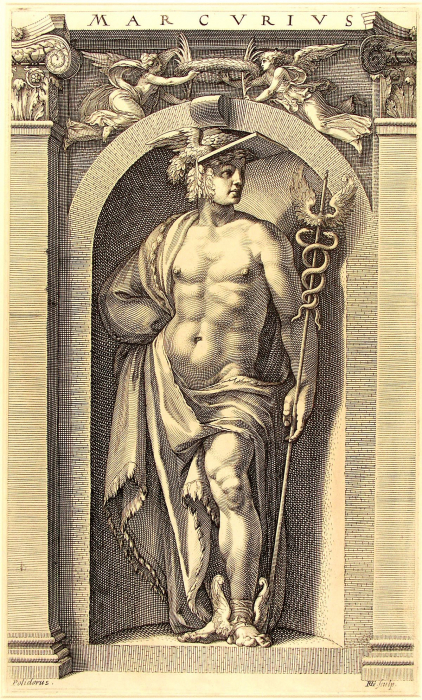Ancient culture is of genuine interest, even after many centuries. Brave heroes, gigantic monsters, and, of course, powerful, beautiful deities, still excite the imagination of lovers of ancient myths.
One of the characters of ancient Roman legends is the god Mercury. What is this deity famous for? And why is the first planet of the solar system named after him?
Material Content:
History of the Roman god of commerce
Mercury is the god of the Roman pantheon (a group of deities). According to legend, he was the son of the supreme celestial of Ancient Rome - Jupiter - and the goddess of spring Maya. The baby was born in a cave on top of Mount Killena. According to legend, the mother gave the baby a breast, but there was so much milk that he could not drink everything. The spilled liquid formed the Milky Way in the sky.

In ancient Rome, the son of Jupiter began to be honored after the beginning of the development of trade relations with other countries. Initially, the deity was "responsible" only for the sale of bread. Like all merchants, Mercury was endowed with resourcefulness and the gift of deception. The ancient Romans revered him for his patronage of businessmen and hard work, forgiving him cunning and deceit. Gradually, he was also considered the defender of crooks and thieves.
Note. The son of Jupiter and Maya was adopted into the cult of ancient Roman deities in approximately 495 BC. In May of that year, on the Aventian hill in Rome, the temple of this celestial was consecrated.
A little later, the Romans began to hold the annual May festival in honor of the patron of the then business people. On this day, May 15, merchants offered thanks to their intercessor and sprinkled themselves with water from a sacred spring.Thus, people seemed to wash away their sins for fraud and lies in trade matters over the past year.
Mercury Attributes
Initially, the patron of trade was portrayed by the Romans as a young man with a tight wallet - a symbol of fishing and earning. But gradually the Romans adopted many elements of ancient Greek mythology, and the deity of the "market" in this regard was no exception. He was identified with Hermes - the Greek twin of the Roman god Mercury. Since then, like his ancient Greek brother, the “Roman”, in addition to his wallet, acquired a winged hat and sandals, and clutched a caduceus wand in his hands.

Winged sandals allowed the celestial to instantly move from one end of the earth to the other. The wings on the cap symbolized the speed of thought. The caduceus wand was a base with two intertwined snakes and was a symbol of reconciliation of people and gods among themselves.
Environment of god
Herald of Heaven, a dodgy merchant in winged sandals, preferred to travel alone, without a retinue. It is interesting that the planet of the same name in the solar system also has no satellites.
But with all this, the Roman twin Hermes was a rather loving celestial and enjoyed the attention of goddesses, nymphs and ordinary mortal women.
Multiple myths ascribe to him the involvement in the origin of about 40 offspring. One of them was Pan - a deity that inspires people with unaccountable fear (panic horror).
Legends and myths
Fast, agile, dodgy Mercury - one of the main characters of legends in ancient Roman mythology. Here are the most common ones.
The Caduceus Wand Myth
Barely born, the cunning son of Jupiter showed a tendency to cunning and fraud. While still very young, he decided to steal cows from the deity of light - Apollo (Phoebe). Unnoticed by the mother, the baby climbed out of the cradle and slowly left the cave. Nearby, a child noticed a turtle, caught it, and made a beautiful musical instrument, a lyre, out of a shell. Instead, he put her in a cradle instead of himself, and he flew into the valley where the cows of Apollo grazed. After a short time, Phoebe discovered the loss and figured out the kidnapper. As a sign of reconciliation, the cunning thief presented the lord of the sun with a lord who emits divine sounds. Apollo, in turn, presented him with a cane. Once, the future patron of trade saw two fighting snakes and threw a cane at them. Snakes entwined around its base, forming a caduceus wand - a symbol of reconciliation.
By the way, Apollo is not the only celestial who suffered from a thieving wand. As a child, he jokingly stole the scepter from Jupiter, the tongs from the forge of Vulcan, the trident from Neptune and the sword from Mars.
Sandal of Venus
There is a myth about how fast Mercury fell in love with the beautiful patroness of love Venus, however, she rejected his feelings. When the goddess bathed in the river, Jupiter, who wanted to help the lover, sent an eagle to her. The bird stole the sandal of Venus and carried it to the Egyptian city of Amitaonia, where he handed it to the admirer with a winged helmet on his head. Coming out of the water, the goddess discovered the disappearance of shoes and began to look for her. The search led Venus to a fan, and a love affair broke out between them. In gratitude, the celestial merchant made the eagle a constellation.
Interesting Facts
A state called Ancient Rome has not existed on the world map for a long time. Nevertheless, interest in the ancient Roman god of commerce has not subsided today.

Here are some interesting facts:
- In 1819, a military brig of the Russian navy equipped with 18 guns was built in Sevastopol. For speed and maneuverability, the ship was named after the fast as the thought of the Roman deity of commerce. During the Russian-Turkish war, under the command of Captain-Lieutenant A. Kazarsky in 1829, the brig defeated two enemy battleships. The crew of the vessel received a reward St. George flag as a reward. The artists devoted a number of works to this event.One of the most famous paintings belongs to the brush of Ivan Aivazovsky (written in 1892).
- Mortals immortalized the name of the Roman celestial merchant, naming the planet in his honor. At the same time, the heavenly luminary exactly repeats the habits of the fast son of Jupiter. The speed of movement of the first planet of the Solar System is several times greater than that of other celestial bodies.
- Few people know that mercury overflowing in medical thermometers is a symbol of Mercury. This is what medieval alchemists called the newly discovered substance. The choice of name was simply explained - mercury was considered a metal whose properties were close to gold (the Sun). Thus, the second name for mercury is due to the fact that the planet-namesake of the Roman celestial is closest to the luminary.
- Many statues have been created in honor of the merchant deity. Some of them are located in Russia. So, along with other figures, the statues of the swift-winged rod-holder adorn Petrodvorets. Faces of the celestial crowning the trading house Kuznetsova on Myasnitskaya street in Moscow.
The ancient Roman god Mercury is identified with speed, cunning, business instinct. A protector of merchants and artisans, he was revered among mere mortals. Mention of a quick as a thought deity can still be found in works of art, architectural structures, and even in astrology.
Prayers to the god of commerce
Ancient Roman merchants began their business with an indispensable prayer to Mercury, since they believed in his intercession and protection.
The approximate text-appeal to God looked like this:
Wise and ancient, but the young messenger of Olympus!
Tricky and fast in flight from the Sun, funny.
In winged sandals, in a helmet that raises up
It makes you rush to the east with a star.
You're a swiftwing, revealing secrets to me
Herbs and metals and magic ancient secrets!
Everything before you appears recorded in scrolls
In runes, il script, il hieroglyphic light.
You whisper to me words, spells and connections,
You control the mind and the thought of love.
Direct my mind to the heights, to the spiritual channel.
Grant wisdom in opus magnum, the work of art.
Help me, for I know your names!
Come to me about Mercury, Hermes, Tahuti!
Vivat Mercurius!
Of course, the text of the appeal is rather intricate and sometimes difficult to remember. And the worship of ancient gods was replaced by other religions. It is useful for business people who profess the teachings of Christ to take note of a few prayers for success in business and business.
“My Lord God, give me, your servant ... a name ... help at the right time and place, protect and guard. Admonish and admonish in matters of life and commerce. ”
Prayer to the Guardian Angel for help in trading
I appeal to you, the angel of Christ.
Ashe protected and protected me, and kept me, for I have not sinned before and will not sin against the faith in the future.
So answer me now, come not me and help me.
I worked very hard, and now you see my honest hands with which I worked.
So let it be, as the Scripture teaches, that it will be rewarded according to the labors.
Give me according to my labors, saint, that my hand, weary of labor, be filled, and that I might live comfortably, serve God.
Fulfill the will of the Most High and bless me with earthly bounties according to my labors.
Amen.
You can also turn to the power of miraculous conspiracies.
Conspiracy to trade (read in the workplace)
This conspiracy was used in the old days by the Russian merchants Bakhrushins and kept secret, it is famous for its effectiveness. It is done on Monday, early in the morning on the growing moon, in the store until the first buyer. Take some sugar with you, to which they plot.
To me, on foot and on horseback, to me, horse and sleigh!
To me, guests are overseas, but people are okolotskie!
Throw all things, come to my shop, come, hurry.
Although you go around the whole world, there’s no better product!
So that my product would be more beautiful for you than a ruddy apple, tastier than honey, sweeter than molasses!
My word is stucco, but it’s hard.
I close it with seven locks, I lock it with seven keys, I throw the keys into the sea-ocean.
My word cannot be interrupted, my business cannot be damaged! Amen.
Pour sugar over the threshold.
Conspiracy with salt
They say the salt, pour it with your right hand and swipe it over your left shoulder in the workplace with the words:
“Hiking, riding, come here, here you have a place, food and water. I have money - you are a good. Amen"












